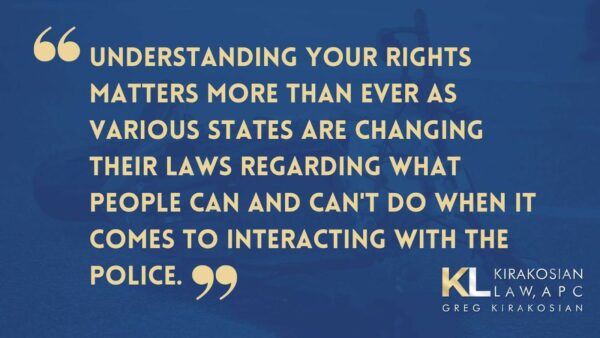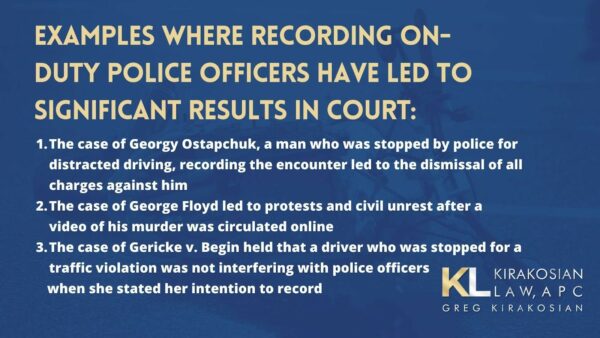If you are being detained or witness someone detained you might ask yourself, “can I record cops while they are on duty in Los Angeles?” The short answer is that in Los Angeles, and in California as a whole, you are most definitely allowed to record on-duty law enforcement officials so long as you are not interfering with their work.
Understanding your rights matters more than ever as various states are changing their laws regarding what people can and can’t do when it comes to interacting with the police.
Table of Contents (click to jump to a specific section)
Situations where recording police resulted in wins for legal action
How to define ‘interfering with their work’
The best way to answer that is by looking at a recent case in which the courts had to decide whether or not someone was interfering with police officers when they were recording them. In the case of Gericke v. Begin, the New Hampshire Supreme Court held that a driver who was stopped for a traffic violation was not interfering with police officers when she loudly stated her intention to record the encounter and then proceeded to do so. The court reasoned that the driver’s actions, while perhaps annoying to the officers, did not physically hinder them from performing their duties.
In California, you can record cops as long as you are not interfering with their work. This means that you can record them from a distance, but you cannot get in their way or block their view. If you are stopped by police, you can tell them that you are going to record the encounter, but you should not put your camera in their face or otherwise try to block their view.
Recording police officers is a great way to hold them accountable for their actions, but it is important to know your rights before you start recording. If you are stopped by police, stay calm and remember that you have the right to record the encounter as long as you are not interfering with their work.

Common sense when recording cops in Los Angeles
As a resident of Los Angeles, you are entitled to know your rights when it comes to recording on-duty police officers. But a good rule of thumb is to apply common sense as well. Common sense means that, while your rights obviously matter, your safety should come first. If you are in a situation where recording police might escalate the situation and put you in danger, it might be best to hold off on hitting the record button.
For example, if you are in the middle of a protest and police are using tear gas or rubber bullets, recording them might not be the best idea. In a situation like that, it is important to follow the instructions of police and other protest organizers so that you can stay safe.
In summary, you can record on-duty police officers as long as you are not interfering with their work. Knowing that, keep common sense as a priority and think of your safety and well-being as well.
Situations where recording police resulted in wins for legal action
There are many examples across the country where recording on-duty police officers have led to significant results in court. In the case of Georgy Ostapchuk, a man who was stopped by police for distracted driving, recording the encounter led to the dismissal of all charges against him.
More infamously, the case of George Floyd led to protests and civil unrest after a video of his murder was circulated online. The officer who killed Floyd, Derek Chauvin, was arrested and charged with murder after the video led to public outcry.
These are just two examples of how recording police can lead to positive outcomes when recording the police. On the flipside, recording the police has led to criminal charges for the person recording in some cases. It is important to know your rights and to use common sense before you start recording police officers.

